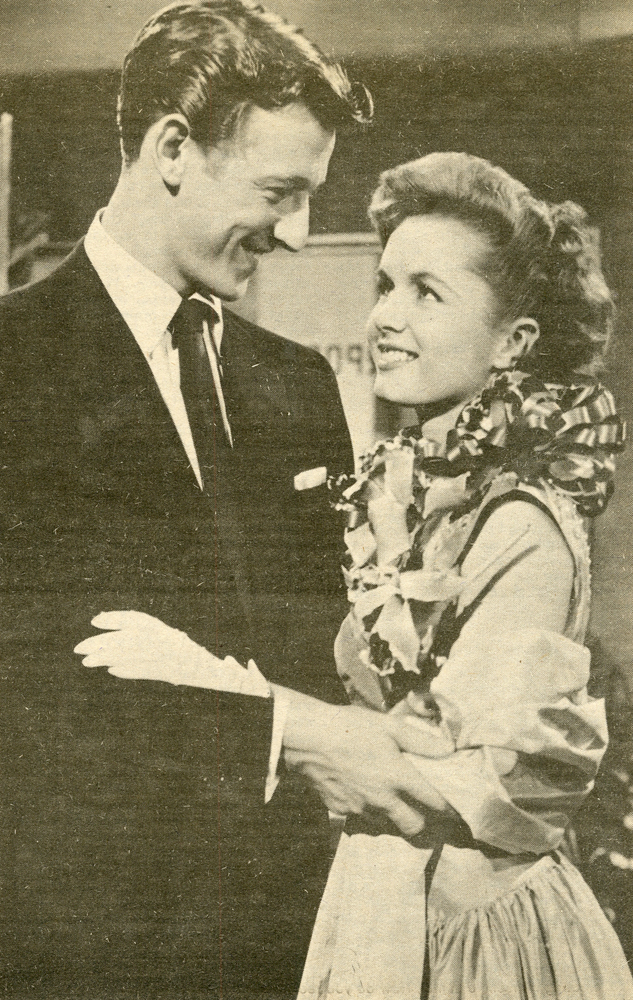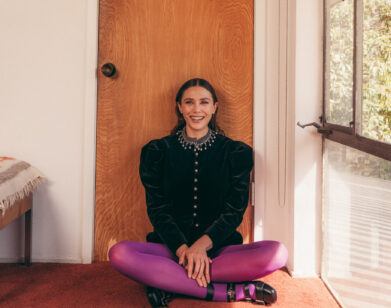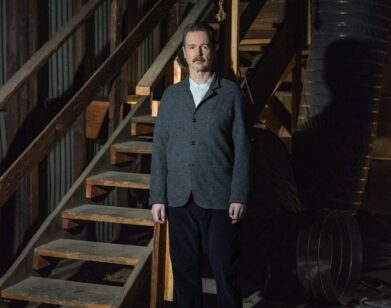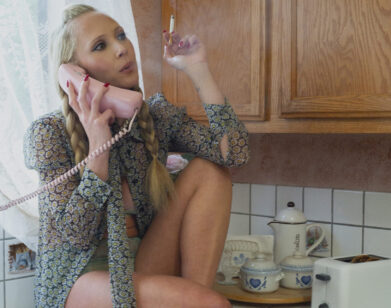Debbie Reynolds
Having premiered last month at the Cannes Film Festival, the documentary Bright Lights: Starring Debbie Reynolds and Carrie Fisher depicts the eponymous mother-daughter duo, whose collective Hollywood résumé spans decades and includes some of the most iconic films of the 20th century. During the 1950s, Reynolds starred in Singin’ in the Rain opposite Gene Kelly, and went on to work alongside the likes of Bette Davis, Frank Tashlin, and Frank Sinatra. Her daughter followed in her footsteps, appearing most famously as Princess Leia in the Star Wars. In honor of Bright Lights, which will air on HBO later this year, below is an interview between Reynolds and one of Andy Warhol’s superstars, Tinkerbelle. Originally printed in September 1976, the two discuss everything from the great Impressionists to face lifts and being mugged—all during drunch. —Ethan Sapienza
Drunch with Debbie and Tinkerbelle
We met in an Upper West Side Restaurant over drunch, which is lunch in mostly liquid form from want of better food. Debbie Reynolds sat across from me wearing a turban which framed a gleaming complexion, so freshly scrubbed I could see my reflection in her forehead. “Great way to save on mirrored sunglasses,” I thought to myself while checking for malignant freckles. John Springer sat on my right, there being no reason for him to stand.
In the main course of our druncheon, the star of The Singing Nun and Tammy, not to mention What’s the Matter with Helen, entertained us with impressions of such greats as Marlene Dietrich and Bette Davis. Many folks aren’t aware of Debbie Reynolds’ versatile talent as a mimic. They just remember her for being married to Eddie Fisher. And although some people insist on making other people famous on basis of to whom they are, and were, married (a fact that has never ceased to baffle me)—Debbie Reynolds is, after all, Debbie Reynolds—actress, singer, dancer, impressionist, comedienne, mother of five, and girl scout.
Since Debbie’s smash hit show Irene said “good-night,” the former Mrs. Harry Karl (see what I mean?) has been on the road with her one-woman show which she herself is producing. Debbie has every intention of bringing her show to New York and Broadway, especially since they’re both in the same town.
But other than the above-mentioned, Mrs. Reynolds manages to maintain a routine existence just like you or I which consists of being mugged in her own home, receiving threatening love and hate mail, yakking on the phone with Bette Davis, dashing off to Las Vegas to perform for a packed house, and attending birthday parties with Frank Sinatra. Yup, if Debbie Reynolds weren’t a star, she’d be known as Carrie Fisher’s mother.
TINKERBELLE TO JOHN SPRINGER: I read you in the Dustin Hoffman Interview. You were fabulous.
JOHN SPRINGER: How about a drink?
TINKERBELLE: I second that emotion.
DEBBIE REYNOLDS: [winking] I’m just going to have iced tea.
SPRINGER: Do we call you Tinker, or Tinkerbelle, or…
TINKERBELLE: Whatever turns you on.
REYNOLDS: I thought they were sending me a fellow named Tinkerbelle.
TINKERBELLE: I hope he didn’t let you down.
[Reynolds winks again]
SPRINGER TO WAITER: An ice tea, a Bloody Mary…
TINKERBELLE: How’d you know I wanted a Bloody Mary?
SPRINGER: I knew what I was having, and it happened to be a Bloody Mary.
TINKERBELLE: Oh, I thought you had ESP. Press agents have to sometimes.
REYNOLDS: I don’t like that mix or whatever it is that they put in Bloody Marys.
TINKERBELLE: Me neither.
[Springer orders me a Virgin Mary which was a mistake on our parts because a Virgin Mary has spices but no liquor and yet people pray to it.]
REYNOLDS: You’ve never been here before? What’s your real name? Are you on a diet all the time?
TINKERBELLE: But shouldn’t I ask you that? How’d you get to Svelteland?
[Our waiter approaches with beverages and we are joined by one bloody and one virgin, Mary.]
REYNOLDS: But I don’t get as thin as you. Weight has never been a problem with me because when you dance, it just stays off. If I ever stop working, I might have a problem. But I never seem to be able to stop working. I always avoid not working. A lot of people don’t feel like doing very much. Or one project is really all they can do at one time. I can have five or six things going at the same time. It doesn’t bother me or tire me, but sometimes it does rattle me. Are the salads here good salads? Because usually New York has lousy salads. What are you kids going to do? I walked around here and I’m glad I did because I passed a laundry and I have to bring the laundry, and I’m looking for a market.
TINKERBELLE: You’re into laundry? I like the hand ones because they iron your sheets for you. Ever try ironing a sheet? You have to put it on the floor. You made Earl Wilson’s column yesterday [along with, coincidentally, Liz Taylor and Eddie Fisher. It’s such a teeny world].
REYNOLDS: Isn’t that thrilling? I made that in 1950, too. I’ve known Earl since I started in the business.
TINKERBELLE: Is your daughter Carrie in your show?
REYNOLDS: I wish she was. Have you ever met my daughter? She recently did a poem for your magazine about four or five months ago. Joan Hackett is a very good friend of Carrie’s and was reading some of Carrie’s works—they used to live together—and Carrie likes to write. I don’t know where she got that because nobody in the family writes, but it’s wonderful that she does, and she’s very good. So Joan Hackett took down some of her poems to your paper which they printed because they were awfully good and a picture of Carrie. She wants to get into writing. She doesn’t want to get into the musical end of it, but that’s really where her biggest talent is—her voice—but she said, “Mother, I can always do that.” I love education and experience more than I’d like to see her go to work right away. It would be better for her while she’s young to study and write. The young people today are really so creative and talented—I mean, the ones who are really are and they get together and produce and create. They’re an entirely different breed from what I was when I was their age.
TINKERBELLE: Did you have a stage mother? Is that why you started working so young?
REYNOLDS: I started to earn money because we didn’t have money.
TINKERBELLE: Was The Daughters of Rosie O’Grady your first movie?
REYNOLDS: Yeah, I was 16. That was a very small part at Warner’s. When I started, I was 16 and had entered a Miss Burbank contest because they gave away a free blouse and scarf. [To Springer] We’ll have to get a bio together somewhere along the line so I won’t have to keep repeating this. Anyway, it was 1948 and I knew I wouldn’t win because I was 16 years old and far from being sexy and glamorous or beautiful or anything like that, and I horsed around because I was sure I wasn’t going to win, and I guess I was amusing, and as a result I became Miss Burbank if you’re ready for that, and I wasn’t, and my father laughed all night because he thought it was so funny and my brother screamed and in those days if you won one of those small town beauty contests, you also won an interview at Warner Brothers or MGM or Fox, and I was sent to Warner’s for an interview and the man thought I was amusing, and they made a screen test of me and they signed me under contract for 65 dollars a week, and when I wanted to go up to 75 dollars they wanted to drop me and they said, “What are we going to do with that girl?”
SPRINGER: But you were playing a lead in a movie.
REYNOLDS: It was a nice part, and at 75 dollars a week they could have taken a chance, but I’m glad they dropped me. This is [Marlene] Dietrich, isn’t it [over the juke]? I’m going to do her in my act. [She whips into her Dietrich.]
TINKERBELLE: Uh Debbie? Excuse me. Thanks. I saw you doing Marlene on the Kopy Kats a while back.
REYNOLDS: They seem to keep re-running those things all the time. It’s a very old tape—it’s four or five years old.
TINKERBELLE: Rich Little was marvelous on that show, wasn’t he?
REYNOLDS: He’s terrific. He deserves all his success. He’s really worked hard.
TINKERBELLE: Wouldn’t you say he’s the best mimic right now?
REYNOLDS: Well, Frank Gorshin is deeper into his portrayals than Rich, but Rich is funny. Frank is a brilliant actor. He gets so into his characters. He’s extraordinarily talented. Years ago he would have been Richard Wildmark in films. He’s really wonderful as an actor, and he’s marvelous as a portrayer of somebody else. He’s more than an impressionist. But Rich Little is incredible. He does 80 million people. There’s absolutely no end to the people he can do. I do impressions, but I know how long it takes to work them up, and I’m always fascinated by how many people Rich can do, and just switch right over on the voices. I have to get more into it than that. I really have to concentrate and think hard on the sound and tone of voice and especially with singers it’s so different—like with [Barbra] Streisand. You really have to keep the pitch right where they do it which is usually the opposite from the way you sing. Barbra sings high in the nose and throat and in the back—anyway, she used to more than she does now. Now she sings much better.
TINKERBELLE: There was a gal on the Kopy Kats who did Streisand and [Judy] Garland quite well.
REYNOLDS: Marilyn Michaels. She was a regular on the Kopy Kats. They had regulars. Gorshin, Rich, and an English impressionist. They had me doing everybody including Jackie Cooper, Fat Jack Leonard.
TINKERBELLE: You do men, too?
REYNOLDS: I didn’t until that show, but they kept saying, “Do this one, do that one,” so I’d go off into a corner and listen to a tape and do it. You can learn fast.
TINKERBELLE: Can you do Kirk Douglas?
REYNOLDS: No. I do Barry Fitzgerald, but that’s about it. I can’t really do any men. I never thought about doing men. Never.
TINKERBELLE: Oh. I think about it all the time.
REYNOLDS: Tiny Tim I did because he was fun and crazy and I thought he was interesting.
TINKERBELLE: I used to know Tiny before he became famous. He came over to my house one day and that was the straw that broke the camel’s back with my roommate. She asked me to move out because my friends were too weird. I was going to ask her to move out because hers were too straight, but she beat me to it.
REYNOLDS: Tiny isn’t doing too well now, is he?
TINKERBELLE: No, and neither is my ex-roommate.
REYNOLDS: It’s sad when you see someone do really well and then you just don’t hear about them anymore.
TINKERBELLE: What I found so interesting about Tiny was watching his acceptance by people who had treated him like an outcast before he became a household word, and as soon as he achieved a modicum of status as a celebrity the tables turned quicker than you can say “I’ve always liked you.” Tiny was a very innocent, naive, gentle person when I knew him.
REYNOLDS: I remember meeting him a couple of times and I did find him to be like a child. Very, “it’ll be all right.” And I wish it were.
TINKERBELLE: I was under the impression from watching That’s Entertainment! that your monkey song, “Abba Dabba Honeymoon,” was your big moment of discovery.
REYNOLDS: No, it was about a year before that movie, and that part wasn’t the biggest but it seemed to do more for me because the record sold over a million copies and from that they decided to put me in Singin’ in the Rain, which was the best thing that could have happened. That’s what enabled me to go under contract and have them come up with some nice films for me. But that era ended very quickly—when Mr. [Louis B.] Mayer was ousted about that time, 1952 I think, and he had planned on my doing Peg O My Heat etc. following Singin’ in the Rain because he built stars. He’d put you in a lead and then another lead and then another lead. You wouldn’t have just one picture and never again. He knew how to do it. And then they dropped Mr. Mayer and broke his heart and all that and you’d hear the pros and cons regarding what a mean man he was, what a good man he was, but to me he was always very nice. Like a father and a grandfather because I was so young. He was never cruel to me, where other stars like Judy Garland and Elizabeth and Katherine Grayson sometimes have said he was mean and a tyrant, and I never saw that. I’m sure that must have been the case with them at times because they were so big and at times they must have been so tired. They just didn’t want to do another picture and they had to do it.
TINKERBELLE: Plus they were big box office.
REYNOLDS: Huge. And I remember Judy being so tired and not well, and she had to do summer stock when she was so ill, and she should not have been asked to do it. Mario Lanza was the same. Sometimes those great, great talents should be understood a little more. They’re only understood in death.
TINKERBELLE: One of your ex-co-stars, Gene Kelly, had some work performed on his face along the lines of a facelift, hasn’t he? He looks remarkably well, yet that irks some people when they witness an interference with the aging process. [Earl Wilson also had happened to mention that Eddie Fisher was treating himself to same.] How do you feel about that?
REYNOLDS: I didn’t know that Gene had had it done but I think, good for him. I don’t see anything wrong in it at all. Hank Fonda started it a long time ago and who cared?
SPRINGER: Hank never had a face lift. He never did. I know.
REYNOLDS: I don’t mean a full face lift. A tuck.
SPRINGER: Yes.
REYNOLDS: I should say facial surgery then. I don’t know what the difference is. Men don’t usually do the whole face. That’s what Gary Cooper did. I guess everybody’s doing it that needs it. And why shouldn’t they? I think it’s terrific. A friend of mine just had his eyes done, and he’s not even in pictures but he had pouches all his life and he hated them all his life, and he had surgery done, and they removed whatever was in there.
TINKERBELLE: Fat pads.
REYNOLDS: And he looks terrific, and he’s never been happier and why not? If it’s your life and it makes you feel better. Everybody’s gonna need it.
TINKERBELLE: Not unless you die young or walk on your hands defying gravity.
REYNOLDS: After 39 it’s all downhill. I don’t mind it, but it’s definitely going downward.
[I wondered out loud why Bette Davis, for example, refrained from stopping the hands of time with the hands of a surgeon.]
REYNOLDS: Bette just doesn’t want to. I asked her about it. She had an appointment for it once, and she said she was all packed and ready to get on the plane, and she just couldn’t do it. She was too frightened. Isn’t it amazing how they only play Dietrich records here?
TINKERBELLE: You worked with Bette when you were 16?
REYNOLDS: In which movie? The Catered Affair?
TINKERBELLE: I beg your pardon, I though Bette was in The Daughters of Rosie O’Grady, which I obviously haven’t seen.
REYNOLDS: That was with June Haver, but Bette was making a film called June Bride and I was an extra in that one, and I used to come on the set, though the sets were closed, and I would hide in the catwalks up above and watch her work so I could learn. One day she was doing a scene in which she was kissing Robert Montgomery, and she had her arms around him and she was lying back and she looked up and saw me and said, “Who is that?” And someone told me to scram. I wasn’t even Debbie then. I was Mary Frances. Jack Warner hadn’t changed my name yet. I flew down that ladder and out of that stage and ran like mad, and she never knew who it was, but that was me up there.
TINKERBELLE: Did you pick up any tips from her?
REYNOLDS: I loved watching her because she had movie technique down pat. She never would waste her energies. If she had a crying scene, she would really cry and carry on, but if it was a long shot, she wouldn’t. She’d just have them tear her eyes and she wouldn’t bother much because it didn’t matter. She knew her craft. And she knew it very, very well. I love her.
TINKERBELLE: And you’re still friendly with her?
REYNOLDS: [Does an impression of Bette.] I called her four times when I was doing Irene and the cast was just dying for her to come, and she promised and promised. She’s always promising. And I’d call her again and she’d say, “Now daughter, don’t be angry. It’s not that I don’t want to. I must go to London.”
TINKERBELLE: She calls you “daughter”?
REYNOLDS: Because in The Catered Affair I played her daughter.
TINKERBELLE: And Frank Sinatra. Are you still in touch with him?
REYNOLDS: We’re friends, yes. I saw him the other day and he looks terrific, and he’s so happy, too, and I’m very pleased because I’ve known Barbara [Marx] for a long time, and she should be a very good wife and he really looks better than he has in year. His hair is almost all grey now. And he didn’t look too good for a couple of years because he was unhappy. Searching for himself, I think. Now he’s really together. It was his daughter Nancy’s birthday and I can’t believe it when I see the children all that grown. It throws me when I see my own.
TINKERBELLE: I heard about your God awful experience when you were moving in California and you were mugged, robbed, and tied up etc.
REYNOLDS: It happened when we were moving into my home that we rented and two men came with guns and put them to our heads and made us get on our knees and they dug through my purse. It was terrifying. Ann Miller had it happen to her a month or so after my incident and they put a gun to her head right outside her house. It’s very dangerous in Beverly Hills, and I don’t know why. I guess they’re hitting where they think the money is.
TINKERBELLE: Did they ever apprehend your assailants?
REYNOLDS: No. I don’t think they’re catching any of them. I know this man who bought my house and he’s very rich and he had just been in the house about five months, which is a magnificent home, and three men came in and held him up and he gave them a lot of money and they wanted more money and he didn’t have any more so they cut his finger off as if to say, “The next time you’d better have more money.” Pretty frightening, isn’t it
TINKERBELLE: I wonder if they might be inspired by the easy prey that the Manson people found, because there were so many people in the house, and yet it didn’t stop anything.
[John Springer brings up the tragedy of the actress who came out of rehearsal and was shot in the streets in L.A.]
REYNOLDS: It wasn’t for robbery or any particular reason. They just shot her. I’ve had a guard with me for 15 years. Long before the Manson thing. I’ve always had life threats, and they’ve always been for real. I’ve always had my guard. I have my cook and my guard. I want to eat, and I want to live.
TINKERBELLE: Why did they threaten your life? Didn’t they like your movies?
REYNOLDS: They were mostly demented men. One man was mad because I didn’t marry him and I married Eddie Fisher. Before that, a man was mad because I wasn’t Catholic, therefore I couldn’t marry him and go to heaven so he had to kill me. But they were all tracked down and committed. When I was in New York doing Irene, a boy sent me an amazing letter stating he was going to strangle me with my own silk scarf and while he did that he was going to “make me his woman.” A very sick letter. So I called the police and they couldn’t track him down, but by golly my hairdresser did. They put him in Bellevue until I was out of town, and I think he’s been released since. So that always makes me nervous when I come back to town.
TINKERBELLE: Do you feel that you’ve been singled out among the celebrated? That it happens to you more than others you know?
REYNOLDS: Everybody. Some people get it more. They just try not to talk about it. But I’m neurotic about it…
From the voice of a stranger, almost on cue!: Ms. Reynolds. I knew you were here and I dashed home to get this album for you to autograph. I got it in my country. I’m from Costa Rica, and I’ve seen this movie 10 times. [Say One for Me with Bing Crosby and Robert Wagner. Things are jumping in Costa Rica.] My name is Jay.
REYNOLDS: This is a film we made at Fox. Sammy Cahn wrote the music for this movie and he wrote the music for Second Time Around.
TINKERBELLE: Is The Tender Trap the film with Frank Sinatra singing the title song while walking down a desert?
REYNOLDS: Out in space. Yes. I have that in a film clip in my act. I do a nine-minute film clip of my first movies where I sing “Ohh Poopie Do,” “Abba Dabba,” “Singin’ in the Rain,” etc. A montage of the movies and most of the movies were musicals that were bombs. We did a great number with Bobby Fosse in Give a Girl a Break and Gower [Champion]. I think it would be great fun to see Bobby really hoofing up a storm.
TINKERBELLE: You’re producing this act yourself? Financially?
REYNOLDS: Oh yeah.
TINKERBELLE: Aristotle Onassis said that if you wanted to make a big buck you should never put your own money into anything. Always use someone else’s money. And he did.
REYNOLDS: Yes, and he had the brilliance to arrange that. As did Mike Todd. I’m not a business sleuth, so I’ve never done that. I’ve always put my own money into my own shows because today, if you want to stay in the business, you have to produce your own product because there is not enough production and enough people that create today so if you wanna work you produce it or you stay home.
[Reynolds’ fan again approaches for her to re-autograph the album cover in ballpoint. I asked Reynolds how she felt about being approached twice by the same person.]
REYNOLDS: It doesn’t bother me. When they don’t it will probably bother me.
TINKERBELLE: Have any gossip columnists hassled you besides Joyce Haber over the years?
REYNOLDS: Hedda Hopper was after me for a long time because I married Harry Karl, and she warned me not to marry an older man. She said, “I married an older man, and it just doesn’t work out. You shouldn’t do it.” And I told her that was one area where she shouldn’t give out advice. But she did and she poked me and poked at me and this went on for three years and finally I drove down to her office and had a confrontation with her and she couldn’t believe it. And we had this big scene and she said, “Who do you think you are?” and I said, “Well who do you think you are?” and in the end we shook hands and she said, “I think you’re right. I’ve been a bitch long enough.” And she stopped. But she used to criticize me for collecting memorabilia. And she said about me, “Spider webs and decay. And that’s where he career is, too.” She was the one who said that Irene had closed out of town and it didn’t have a chance and “If Debbie can’t make it in Hollywood, she certainly can’t make it on the road.” She never really quit.
TINKERBELLE: But you can’t accuse her of playing up to you.
REYNOLDS: She was furious that Irene was a success. I thought she would die from that.
TINKERBELLE: And how about you and Rona Barrett? Especially since she was so infatuated with Eddie Fisher, and you married him.
REYNOLDS: Rona and I get along great. I’ve known her forever. I knew her when she was in Eddie’s fan club. I like Rona. She’s straight-on. And she would never be upset with me because I was very good to Eddie. I’ve never said a bad thing about him ever.
TINKERBELLE: The New York Post ran some excerpts about a year ago from a book about movie stars and their “first time” and you were quoted as saying that Eddie Fisher was your first lover—after you were married.
REYNOLDS: I lead such a boring life. People ask me, “Are you really like that, Debbie?” An interviewer once said to me, “You really can’t be a girl scout and involved in all these causes. There really must be something that you do wrong.” I do a lot of things wrong. I lose my temper, and I hate waiting in line, but do I take drugs? No. Do I run around deploring the world? No. I’m just not into it. I was brought up that way.
TINKERBERLLE: You’ve never had any real scandals. Especially compared to Louise Lasser and remember Barbara McNair a few years back when someone mailed her heroin?
REYNOLDS: No, I’ve never had any problems like that and no one has ever put anything into my suitcase.
TINKERBELLE: Do you think the scandals carry much weight anymore? It seems to have done Louise more good than harm. Kenneth Anger said recently that Hollywood has lost its scandal charm—and instead of writing a sequel to Hollywood Babylon he’s returned to Washington for a Washington Babylon.
REYNOLDS: It’s tame compared to what went on in the ’30s. That’s for sure.
TINKERBELLE: Do you think more actually went on then or has it just it’s shock value because we’re not so puritan anymore?
REYNOLDS: I think that the working hours and star pressures pushed a lot of people into drugs in those days. And there seemed to have been a lot of alcoholism. I read the book and though I wasn’t around at the time, it seems to have been quite an era. They drank themselves into early graves or whatever… murder? We don’t have that now except for what happened to Sal Mineo who must have gone the ways of the wild, and he was a very nice young man. I guess a lot of things happen still. In our town people don’t have the parties that they used to. Everyone is pretty much at home. Not like New York. I was thinking about that the other day. Here, people give cocktail parties. You drop in and then you go to another cocktail party. It’s very open. Everybody gets together here: the playwrights, the directors. All the time. When I was living here, I was invited and invited. It’s interesting. We don’t have that on the West Coast.
TINKERBELLE: Because of the Group A and Group B lists?
REYNOLDS: That does exist in California as far as who to invite to the party when there is one. But I don’t give parties, and I’m not in that social scene. I couldn’t care less.
TINKERBELLE: You couldn’t? But isn’t being on the Group A list the ultimate achievement? I mean, what else is there? [Did they have that list in the ’40s and ’50s? I wondered to myself. Probably not, since they didn’t have Joyce Haber. But if they did, would Ronald Colman and Marilyn Monroe be in Group A? And what about Errol Flynn? Everyone knows he gave the best parties.] Do you have any special surprises for us in your act besides those that you’ve already mentioned?
REYNOLDS: My act is a variety, musical, vaudeville show with a lot of big sets and production which is different from other acts because of the sets and big production numbers on stairs like the old Ziegfeld kind of shows and it’s not just a one-woman show in the sense that I’m alone on the stage with a microphone. We have so much production, it’s taking four trucks to ship it in and a lot of money to do it. But this will enable me to come back to New York and work and keep up a certain amount of interest in my career, because I think eventually my work will be only the stage and/or certain TV specials. But it certainly isn’t always going to be in nightclubs because that’s a very grueling business and an unrewarding career at best.
TINKERBELLE: Assuming you were one, what do you think becomes a legend most?
REYNOLDS: I think it’s just if you live long enough to come back in style.
THIS INTERVIEW ORIGINALLY RAN IN THE SEPTEMBER 1976 ISSUE OF INTERVIEW.
New Again runs on Wednesdays. For more, click here.







